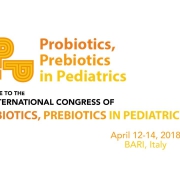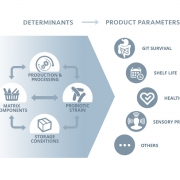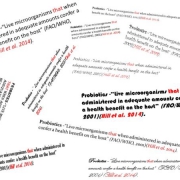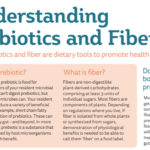Probiotics in the Year 2018
Prof. Daniel Merenstein MD, Georgetown University School of Medicine
Messages about probiotics seem to be everywhere. It is difficult for me to keep up with the emails, links, and stories I am sent by friends and colleagues. I am regularly asked my opinion about new studies. Null trials seem to really generate the most interest, with some people looking for limitations of the study and others generally over-extrapolating the null results, seemingly at times to generate the brashest headlines.
Today I want to take a step back and share how I see probiotics in 2018.
I just reviewed a 109-page NIH grant focused on a probiotic intervention for use in a resource poor area. Throughout the grant, the authors never once defined probiotics—presumably because the definition is so commonly known. They did define ‘prebiotics’ but they never felt the need to define probiotics. Imagine that: 2018, and probiotics no longer need to be defined lest the authors seem pedantic. This would not have been the case even five years ago.
Probiotics are backed by real science, they are here to stay, and they are impacting both how we practice medicine and how consumers care for their own health. These are real products with some robust outcomes supported by well-done, independent studies. That is worth emphasizing: there is level 1 evidence for certain products and indications. On the other hand, the use of many probiotics is not evidence-based and expectations about some are not realistic. In the real world, products do not work for every indication or study population. Effect sizes and effectiveness for most indications are often small. One of my true hesitations about fecal microbial transplantation* is how nearly every study has over 90% effectiveness. That gives me cause for concern.
Thus, when there is a null trial the skeptics shouldn’t over extrapolate and the probiotic devotees should not attack the authors. We can look to studies on other treatments as an example: In November of this year NEJM published an article that showed a new antibiotic did not work well for gonorrheal pharyngeal infections. What I didn’t see were any headlines stating, “Antibiotics don’t work for pharyngeal infections.” But headlines involving probiotics often make erroneously broad generalizations. There clearly are indications for which no probiotic has been or will be shown to work. Selling a probiotic for that indication is clearly unethical. But considering the robust evidence base we have for the indication of probiotics for gastroenteritis, it is inappropriate – after 2 null trials – for headlines to read, “Probiotics Do Not Ease Stomach Flu” or “Probiotics No Better Than Placebo for Gastroenteritis”.
This fall I spoke about probiotics at two conferences, the annual meetings of the American Academy of Family Physicians (AAFP) and the annual meeting of the Academy of Nutrition and Dietetics (FNCE). I had never spoken at either conference. With the help of a colleague, I gave two talks at AAFP; both were over-registered with all 600+ spots taken. At the FNCE, the talk was also over-registered with 350 in attendance. The level of interest in probiotics was astonishing.
What I learned from my talks is that as long as there are well-designed studies demonstrating benefits, professionals are open to probiotics and will use them correctly. Further, both the FNCE and AAFP audiences shared similar concerns: can you trust that probiotic product labels are truthful regarding contents, and are there any safety concerns? Good science and quality oversight need to continue to address these important concerns.
2018 was a great year for the advancement of probiotics in mainstream medicine. However, I think for physicians to fully embrace probiotics, the probiotic industry will better need to police itself and make sure the products they sell are what they say they are. Then they need to communicate this on the product label, using a valid quality seal (such as offered by USP), so physicians and consumers will be confident about what they are using. If the science continues to advance and we communicate about it responsibly, the use of probiotics will be used appropriately and more frequently – as they should be.
*For all my colleagues in the gastroenterology world who have fallen in love with fecal transplant for recurrent C. diff, the totality of evidence as of this writing is: 187 total patients, 5 studies (2 enema, 2 colonoscopy and 1 via-nasoduodenal tube), and punchline, TWO studies were blinded. The one with the lowest rate of success was the only one that was placebo-controlled and blinded. The other blinded study was donor versus patients’ own stools. Stew on that and feel free to correct me.















